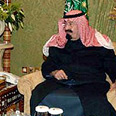
Saudi Arabia rebuffs US on ties to Israel
Following talks with American Secretary of State Hillary Clinton, Saudi Foreign Minister Prince Saud al-Faisal says his country is not interested in taking steps suggested by Mideast peace envoy George Mitchell until Jewish state accepts Arab demands to withdraw from all Palestinian territories
WASHINGTON - Saudi Arabia on Friday bluntly rejected US appeals for improved relations with Israel as a way to help restart Middle East peace talks as its foreign minister accused the Jewish state of not being interested in a deal.
After talks with Secretary of State Hillary Rodham Clinton, Saudi Foreign Minister Prince Saud al-Faisal said his country is not interested in taking steps suggested by US Mideast peace envoy George Mitchell until Israel accepts Arab demands to withdraw from all Palestinian territories.
"Incrementalism and a step-by-step approach, has not and, we believe, will not lead to peace," Saud said as Clinton looked on at a joint State Department news conference. "Temporary security and confidence building measures will also not bring peace."
"What is required is a comprehensive approach that defines the final outcome at the outset and launches into negotiations over final status issues," the prince said, referring to the borders of a future Palestinian state, control of Jerusalem, the return of Palestinian refugees, water and security.
President Barack Obama, Clinton and Mitchell have all been urging Arab nations to improve ties with Israel with confidence-building measures such as opening trade offices, allowing academic exchanges and civilian Israeli aircraft to overfly their airspace as a way of demonstrating their commitment to peace.
Clinton repeated that call in her remarks, saying the Obama administration wants "the Arab states, including our friends in Saudi Arabia to work with us to take steps to improve relations with Israel, to support the Palestinian Authority and to prepare their people to embrace the eventual peace between the Palestinians and the Israelis."
"Saudi Arabia's continued leadership is absolutely vital to achieve a comprehensive and lasting peace," she said.
But Saud flatly rejected such steps. He maintained that Israel was trying to distract the world from a Saudi-proposed Arab-Israel peace deal in which Arab states would recognize Israel provided it withdraws from Arab territory seized in the 1967 war.
"The question really is: 'What will Israel give in exchange for this comprehensive settlement offer'?" Saud said, noting that Israeli Prime Minister Benjamin Netanyahu has ignored US calls to stop constructing Jewish settlements in the West Bank and building housing in east Jerusalem.
"Israel hasn't even responded to an American request to halt settlements, which President Obama described as illegitimate," he said.
The Saudi stance is complicating Mitchell's efforts to bring the Israelis and Palestinians back to negotiations.
But Clinton denied that the odds were insurmountable. She said Mitchell, who just returned from his fifth trip to the region, was making progress and developing a formula to get the two sides talking again.
"We feel like we're making headway and we are determined to do so in as short a period of time as possible," she said.
House delegates call for Saudi gestures
Earlier Friday, more than 200 House of Representatives delegates sent a letter to Saudi King Abdullah, expressing their disappointment with his country's failure to act on Obama's request for steps towards normalization in its relations with Israel.
In their letter, the delegates criticized Saudi Foreign Minister Prince Saud al-Faisal for saying that his country would not take any steps "of its own" to advance the process.
As al-Faisal met with Clinton at the State Department, the House delegates urged the Arab kingdom to take a dramatic and immediate step in order to advance the process.
The delegates noted that Egyptian President Anwar Sadat visited Jerusalem in 1977 and that Jordan's King Hussein launched talks with Israel long before signing a peace agreement with the Jewish state.
We are disappointed with your government's public response to President Obama's requests, the delegates said. Instead of expressing willingness to tear down the barriers between the Arabs and the Palestinians, they added, the Saudi foreign minister declared that Saudi Arabia would do nothing towards normalizing the relations before all Arab lands are returned.
The American delegates asked the Saudi king to act as a leader and make dramatic gestures towards Israel, similar to the steps taken by the leaders of Egypt and Jordan.
We believe, the delegates added, that such a move on your part would help open the door and strengthen the initiative presented by President Obama in Cairo.










